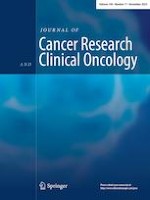Erschienen in:

31.08.2023 | Research
Machine learning and single-cell sequencing reveal the potential regulatory factors of mitochondrial autophagy in the progression of gastric cancer
verfasst von:
Chen Wei, Yichao Ma, Fei Wang, Yuji Chen, Yiqun Liao, Bin Zhao, Qi Zhao, Dong Tang
Erschienen in:
Journal of Cancer Research and Clinical Oncology
|
Ausgabe 17/2023
Einloggen, um Zugang zu erhalten
Abstract
Background
As an important regulatory mechanism to remove damaged mitochondria and maintain the balance between internal and external cells, mitochondrial autophagy plays a key role in the progression and treatment of cancer Onishi (EMBO J 40(3): e104705, 2021). The purpose of this study is to comprehensively analyze the role of mitochondrial autophagy-related genes in the progression of gastric cancer (GC) by RNA sequencing (RNA-seq) and single-cell RNA sequencing (scRNA-seq).
Methods
GSE26942, GSE54129,GSE66229,GSE183904 and other data sets were obtained by GEO databases. Using support vector machine recursive feature elimination (SVM-RVF) algorithm and random forest algorithm, the mitochondrial autophagy-related genes related to gastric cancer were obtained, respectively. After that, the model was constructed and the inflammatory factors, immune score and immune cell infiltration were analyzed. Furthermore, according to the scRNA-seq data of 28,836 cells from 13 GC samples, 18 cell clusters and 7 cell types were identified by scRNA-seq analysis. The expression level and signal pathway of related genes were verified by cell communication analysis. Finally, the regulatory network of cells was analyzed by SCENIC.
Results
MAP1LC3B, PGAW5, PINK1, TOMM40 and UBC are identified as key genes through machine learning algorithms. CXCL12-CXCR4, LGALS9-CD44, LGALS9-CD45 and MIF (CD74 + CD44) pathways may play an important role in endothelial cells with high score scores of T cells and monocytes in tumor environment. CEBPB, ETS1, GATA2, MATB, SPl1 and XBP1 were identified as candidate TF with specific regulatory expression in the GC cell cluster.
Conclusion
The results of this study will provide implications for the study of the mechanism, diagnosis and treatment of mitochondrial autophagy in GC.











